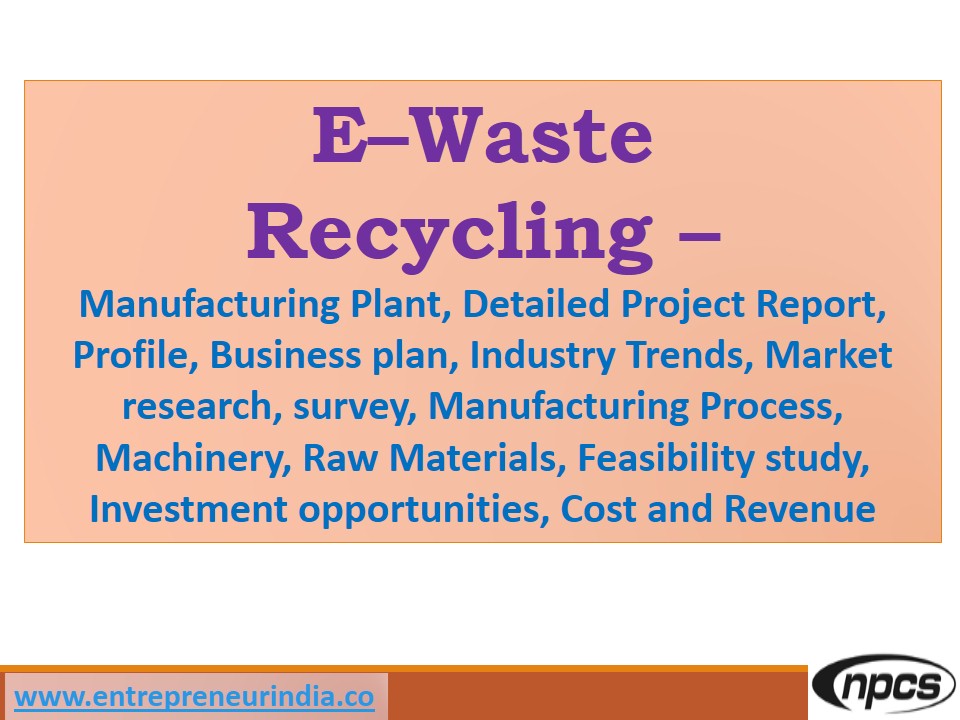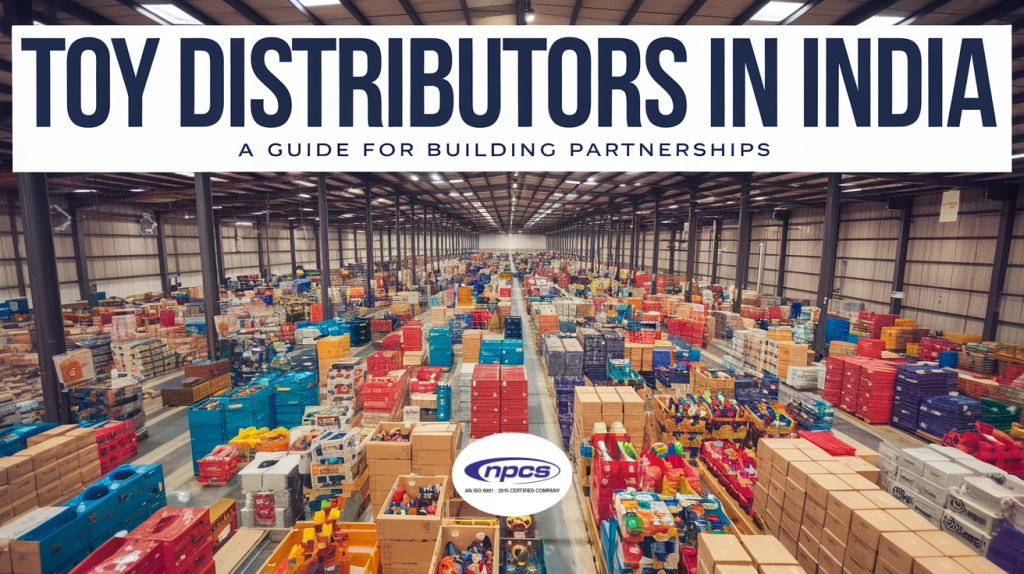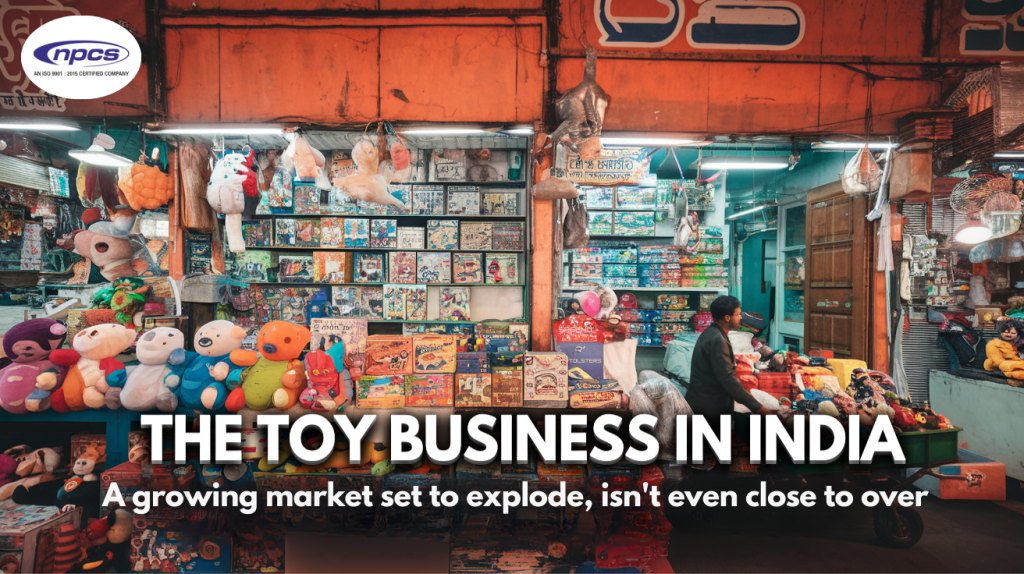E–Waste Recycling Plant Detailed Project Report, Profile, Business plan, Industry Trends, Market research, survey, Manufacturing Process, Machinery, Raw Materials, Feasibility study, Investment opportunities, Cost and Revenue, Manufacturing Plant, Plant Economics, Production Schedule, Working Capital Requirement, Plant Layout, Process Flow Sheet, Cost of Project, Projected Balance Sheets, Profitability Ratios, Break Even AnalysisÂ

E-waste is a popular, informal name for electronic products nearing the end of their “useful life.” Computers, televisions, VCRs, stereos, copiers, and fax machines are common electronic products. Many of these products can be reused, refurbished, or recycled. Unfortunately, electronic discards are one of the fastest growing segments of our nation’s waste stream. Electronic wastes, “e-waste”, “e-scrap”, or “Waste Electrical and Electronic Equipment” (“WEEE”) is a description of surplus, obsolete, broken or discarded electrical or electronic devices. Technically, electronic “waste” is the component which is dumped or disposed or discarded rather than recycled, including residue from reuse and recycling operations.
A range of techniques is currently applied for retrieving components and materials from WEEE. The essential features of these systems generally conform to a scheme of: sorting/disassembly; size reduction; separation. The main components of WEEE, in terms of weight, are iron and steel followed by plastics as can be seen, iron and steel are the most common materials found in electrical and electronic equipment and account for almost half of the total weight of WEEE. Plastics are the second largest component by weight representing approximately 21% of WEEE. Non-ferrous metals including precious metals represent approximately 13% of the total weight of WEEE and glass around 5%.
WEEE has been identified as one of the fastest growing sources of waste in the India, and is estimated to be increasing by 16-28 per cent every five years. Within each sector a complex set of heterogeneous secondary wastes is created. Although treatment requirements are complicated, the sources from any one sector possess many common characteristics. However, there exist huge variations in the nature of electronic wastes between sectors, and treatment regimes appropriate for one cannot be readily transferred to another. Thus, as an entrepreneur, E- Waste recycling offers an exciting opportunity to you.
See more
http://goo.gl/JSwLDU Â Â Â
http://www.entrepreneurindia.co/
Tags
Business guidance for E waste recycling plant, Business guidance for E Waste treatment, Business guidance to clients, Business Opportunities in Electronics Recycling Sector, E waste business ideas, E waste disposal methods, E waste management, E waste recycler, E waste recycling business plan, E waste recycling Business, E waste recycling in India, E waste Recycling Management, E waste recycling plant in India, E waste recycling plant project report, E waste Recycling plant, E waste recycling Small Business Manufacturing, Effects of e-waste on environment, Electronic Waste treatment, E-waste business plan, E-waste for Safe Disposal, E-Waste Management & Clean Technologies, E-waste Management, E-waste Recycling and Process of Recycling Electronic Waste, E-Waste Recycling Based Profitable Projects, E-Waste Recycling Based Small Scale Industries Projects, E-Waste Recycling Business How to Start, E-Waste Recycling Industry in India, E-Waste Recycling Projects, E-Waste Recycling Technologies, E-waste rules by ministry of environment and forests, Great Opportunity for Startup, How is Electronic Waste Recycled, How to make money out of E-waste, How to Open an Electronic Recycling Company, How to set up e waste recycling plant, How to start a successful E waste recycling business, How to Start an E waste recycling project?, How to start an e-waste company, How to Start an E-Waste Recycling Business, How to Start an e-Waste Recycling Business, How to Start E Waste Recycling Business, How to Start E-Waste Recycling Industry in India, Most Profitable E-Waste Recycling Business Ideas, New small scale ideas in E-Waste Recycling industry, Open an e-waste recycling plant, Preparation of Project Profiles, Process technology books, Profitable Small Scale E waste recycling Manufacturing, Recycling of Battery, Recycling of Cell Phone, Recycling of Computers, Recycling of e waste, Recycling of electronic waste, Recycling of LCD, Recycling of liquid crystal display, Recycling of printed circuit board, Setting up an e-waste recycle unit, Setting up and opening your E waste recycling Business, Small scale E waste recycling production line, Small Scale E-Waste Recycling Projects, Start an E-Waste Recycling Business, Start e waste recycling business, Starting a E-Waste Recycling Business, Starting E-Waste Recycling Business in India Business Plan, Start-up Business Plan for E-Waste Recycling plant, Startup Project for E-Waste Recycling plant, Technology Book on E-Waste Recycling, WEEE and E-waste management, What is e waste, Project report on E Waste Recycling industries, Detailed Project Report on E Waste Recycling plant, Project Report on E-Waste Recycling plant, Pre-Investment Feasibility Study on E Waste Recycling unit, Techno-Economic feasibility study on E-Waste Recycling plant, Feasibility report on E-Waste Recycling plant, Free Project Profile on E-Waste Recycling plant, Project profile on E-Waste Recycling plant, Download free project profile on E-Waste Recycling unit
Contact Form
Error: Contact form not found.





